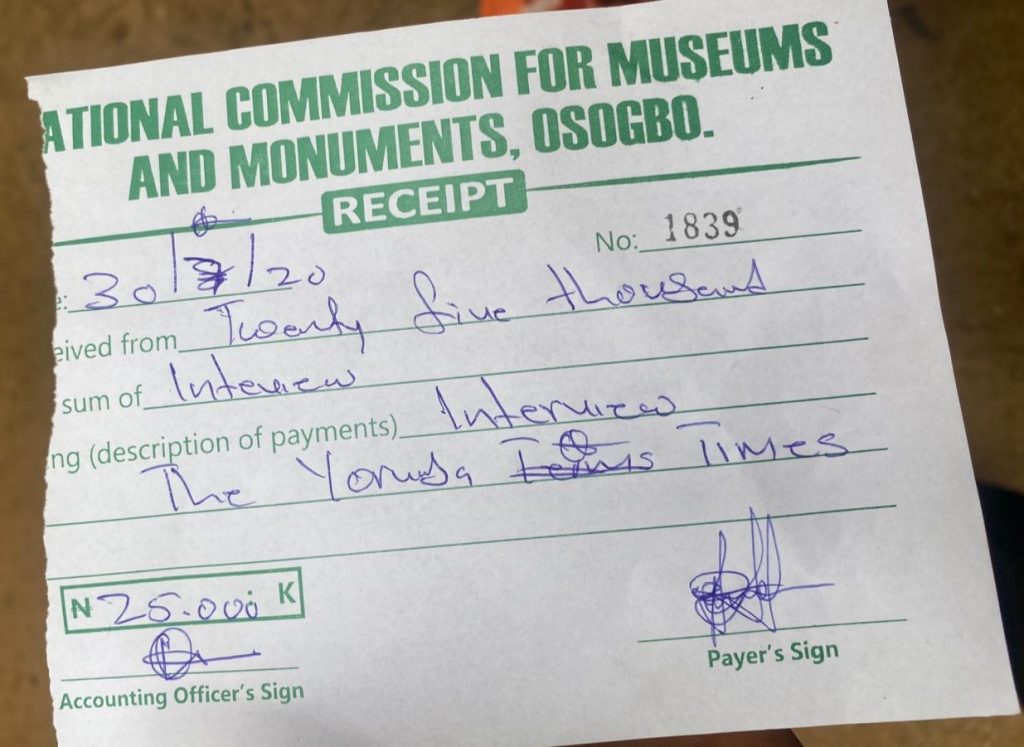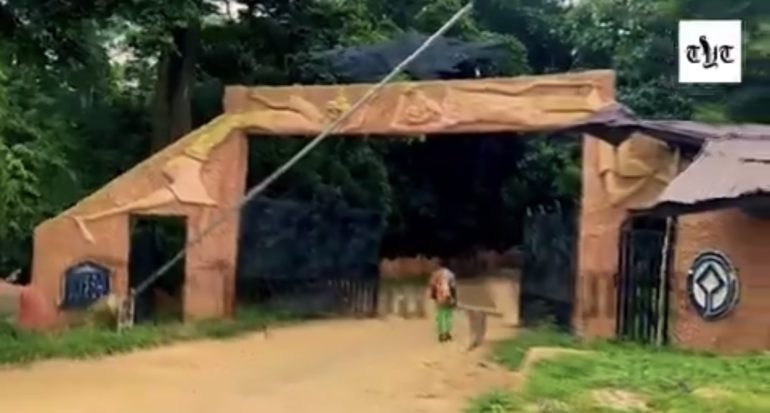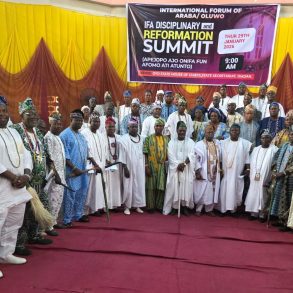I Saw Hell Covering Osun Osogbo Festival
Exposed: Top Official Demanded Bribe from Me to Report from Osun Osogbo Sacred Grove
August 23, 2024
By Samuel Ogunsona, Osogbo
Among the national monuments and treasures that project Nigeria on the world map, the Osun Osogbo Grove stands tall, shoulders above the rest. With its unique temples, distinctive art, serenity and a sense of peace that awe the thousands of visitors that throng the site every August for the annual Osun Osogbo Festival, the grove has, for much of its 700 years of history, sustained Yoruba culture and traditions in a manner no other monument or shrine has done.
Year after year, people from all over the world-America, Europe, the Caribbean countries, even from far-flung places like Brazil, besiege the grove to pray to the deities on all manner of problems that beset them, especially fertility issues. The grove is home to the goddess of fertility, and other Yoruba deities, and they are renowned for their boundless powers to solve virtually all human problems, no matter how hard. Indeed, the grove, and by extension the Osun Osogbo Festival, gained such global acclaim that the United Nations Educational, Scientific and Cultural Organization, UNESCO, named the place a UNESCO World Heritage Site in 2005.
As in previous editions, this year’s Osun Osogbo Festival attracted a lot of people and races from across the world-black, white, brown, Latinos, Asians, etc. They came in their thousands. And despite the huge crowd that throng the grove daily, the organization was perfect. Security was tight. The atmosphere was convivial. It was a phenomenal celebration culture and tradition. Everything was seamless. No hiccups.
Except that some journalists saw hell in the hands of officials who wanted their palms greased before they (reporters) were allowed to do their job. This writer was one of them.
During the just concluded Osun Osogbo festival, which started on Monday, July 29, 2024, some Government officials, tasked with facilitating the effective coverage of the festival, openly solicited for bribes from The Yoruba Times reporters assigned to cover the event.
This egregious practice, if unchecked, can undermine the integrity of the festival and its principal stakeholders, the media, and the government itself.
For instance, journalists, who were essential to sharing the stories and significance of the festival with the world, were coerced into paying outrageous amounts of money to access the sacred grove. They were made to pay various sums for taking photographs, video coverage and conduct interviews with worshippers, visitors, even officials at the sacred grove. This practice not only compromised their independence but also created an uneven playing field, where only those who can afford the outrageous charges were granted access and full rights to report.
The solicitation of bribes by these officials was a stark reminder of the pervasive corruption that plagues Nigeria. It was strange that those entrusted with promoting the festival and facilitating media coverage were instead using their positions for personal gain.
My experience at the grove
My employers, The Yoruba Times, assigned me to cover the Osun Osogbo festival from as many interesting angles as possible. Apart from writing stories, I was to take exclusive photos and videos. I brimmed with excitement as I left Lagos for the assignment in anticipation of a bountiful harvest of stories. But my excitement and expectations nosedived and took an unexpected turn when I encountered people who, rather than facilitate my work, made strange demands on me at the sacred grove.
Maybe I should start my shocking story from the very beginning.
As a journalist, I have had my many experiences covering local and international events. But none was as disheartening as my recent encounter at the Osun Osogbo Sacred Grove during the last Osun Osogbo festival. I had left Lagos around 7:45a.m. on Monday, July 29, 2024, for Osogbo, eager to capture the essence of the festival and share same with the world through video coverage and interviews.
Upon arriving Osogbo at 11:30am, I checked into my hotel and promptly headed to the Osun Sacred Grove. There, I was approached by one Mr. Oyewole Taofeek, who introduced himself as the Chief Security Officer. I identified myself as a reporter from Lagos, assigned to cover the Osun festival. He redirected me to his superior, Mr. Aworeni Joseph Abayomi, Director of National Museum, citing procedural requirements for video coverage at the sacred grove.
Following his instructions, I proceeded to Mr. Aworeni’s office at the Ataoja of Osogbo’s palace. Upon arrival, I found him alone in his office and reintroduced myself, explaining my intention to capture comprehensive video footage at the sacred grove and conduct interviews with officials, workers, and devotees.
He demanded a staggering amount of money in exchange for access to the grove and an interview with the authorities.
He presented a questionable list, purportedly from the Federal Government, with staggering fees for capturing images, videos, among others at the sacred grove.
Below is the price list they tossed at me:
-Digital camera usage: N40,000 to N180,000
-Pin whole camera usage: N5,000
– Phone usage: N1,500 to N2,500
To me, the list and the outrages charges appeared like a scam. The motives of the official also appeared hazy. Very suspicious.
I asked him to provide the supposed official list of fees so I could document it and share it with my organization for accountability and transparency purposes. He flatly refused stating that he didn’t want the information to be made public.
“That’s the standard fee for journalists, and bloggers,” he told me non-challantly.
I never knew he was just starting with me. Again, I inquired about arranging interviews with his workers, devotees, and potentially the Ataoja of Osogbo. Mr. Aworeni responded with a hefty price tag, demanding a minimum of N200,000 for the king’s interview, and that I would also offer his workers some form of payment, as they wouldn’t agree to be interviewed without compensation.
I was shocked and disappointed by this strange request. As a journalist, I believe in fair and transparent reporting, and this demand seemed like outright extortion. I tried to negotiate but Mr Aworeni was adamant. He stood his ground.
Frustrated, I departed his office that day without conducting any interview. I didn’t disguise my disappointment as I informed Mr. Aworeni that I would return to is office the following day as I needed to consult with my colleagues about raising the requested amount. Little did he know that I intended to come back with recording devices, ready to capture the evidence of his unethical requests.
The following day, I returned with my videographer, armed with video and audio recording devices to document Mr. Aworeni’s unethical demands. I revisited our previous conversation, negotiating the fees for video coverage and workers interviews. Referring to his alleged Federal Government list, he told me that I fell under the N40,000 category. I offered him N20,000, he rejected it. Eventually, we settled for N25,000 for video coverage.
Note: Our conversation was in Yoruba language
After reaching a mutual agreement on the amount, Mr Aworeni drove us to the sacred grove in his car to facilitate the payment and complete the necessary arrangements
Arriving at the grove, despite my refusal to pay cash, Mr. Aworeni insisted on payment. I requested for the official bank details of National Commission for Tourism, or Arts and Culture, he couldn’t provide any. Instead, he asked me to deposit the money into his worker’s bank account, Folashade G Ayodele, with an additional N500 fee charges for her to withdraw the cash at a Point-of-Sales (POS) machine and give to him.
The worker issued a receipt with the description “Interview” after the payment.

However, I sought clarification on the receipt from a local resident who wished to remain anonymous because of the sensitive nature of the matter. They revealed that the receipt was actually the standard entrance fee receipt issued to visitors, typically not exceeding N500. They further explained that visitors are only required to pay the entrance fee, and no additional fees for video, pictures, or camera usage. According to them, once the entrance fee is paid, visitors are free to film or take pictures within the grove.
Mr. Aworeni subsequently granted me permission to conduct interviews with two of his workers, including himself. He, however, demanded an additional payment for the interviews, which I reluctantly paid in cash – N6,000.
A human rights activist, Dr Gideon Adeyeni, who is also an indigene of Osun state, said it was disheartening to see heritage sites and traditional assets of ancient communities being exploited for personal gains through extortion. He recalled with regret the frequent reports of visitors being exploited by unscrupulous persons while attempting to explore and document these sites and assets.
Dr. Adeyeni said: “It is rather unfortunate that heritage sites and traditional assets – institutional and material – of ancient communities have become means for extortion by some individuals. Stories of people being extorted while trying to sight and document these sites and assets are quite common. I do not think that this is the way to develop their tourism potentials and improve the archeological and anthropological understandings around them.
“Rather than allow some individuals to arbitrarily set rules and determine rates to be charged from patrons of the groove and other such sites, the Ministry of Tourism would do well to set and sufficiently publicize standard and considerable rates for patrons, while incentivizing research and documentation efforts which may help promote their touristic value rather than frustrating such efforts. Extorting researchers, journalists and other patrons is just nothing but absurdity.
“Such rates as suggested could be published conspicuously at the entrance of the sites and at other relevant locations so that they may be well known and they can thus be easily enforced.”
The experience left a sour taste in my mouth, and I couldn’t help but wonder how many other journalists had faced similar treatment.
This encounter highlights the need for transparency and accountability at the Osun Osogbo Sacred Grove.
Journalists should not be forced to pay exorbitant sums to do their job, and the authorities must ensure that they provide a conducive environment for reporting.
I hope that in the future, authorities at the grove will take steps to address this issue and promote a more open and inclusive environment for journalists and visitors alike.






